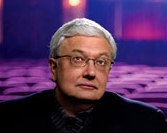 Yesterday evening the nation's most popular film critic, Roger Ebert, who has been on an extended leave-of-absence from his TV show for the past year following complications from cancer surgery, participated in a moderated online chat at ebertandroeper.tv.
Yesterday evening the nation's most popular film critic, Roger Ebert, who has been on an extended leave-of-absence from his TV show for the past year following complications from cancer surgery, participated in a moderated online chat at ebertandroeper.tv.
None of the questions I submitted was chosen (I blame the Disney-employed moderators), but it was great to hear from Ebert, even if only virtually. Some of the (text-uncorrected, hyperlink-enhanced) highlights:
Chris:
Has anyone that you know personally ever been mad about a negative review of a film that they were a part of, or has knowing someone personally ever swayed a review?Roger Ebert:
I'm glad I live in Chi so I don't know a lot of the movie people well. It is hard to pan a friend, but I do it. The great Robert Altman once asked me, "If you never gave me a bad review, what would a good review mean?"
Joseph:
If it were possible to live in a world where the written word was paramount, would you forgo a thumbs up and star rating?Roger Ebert:
Yes. Or lacking that, I'd like a five-star or horizontal thumb system where you could have a true middle position, which is really where I am some of the time.
JK:
Did you ever read a movie review in which the critic made some valid and interesting point that you missed completely in your own experience of the same movie? In other words, where you ever WOWed by someone else's criticism?Roger Ebert:
One critic I often bow to is Stanley Kauffmann of The New Republic. But yes, any good critic can see something one missed, and vice-versa.
Chris:
Why on earth would anyone want to watch a subtitled movie??? Especially if its in a theatre were you cannot go back if you missed anything. This is a no brainer, sure they may be good movies,but I want to watch the actors ACT , if I am constantly reading to keep up with the movie I miss seeing the film , this is what books are for.Then there is the problem of not being able to read whats on the screen when it is against a white background,Yellow should be the default colour not white. This is my big point how can you review a movie if you can not watch the expressions on the faces etc. of all the actors.Roger Ebert:
Because you don't just WATCH actors act, you HEAR them. Why rob an actor of his or her instrument? Dubbed movies sound phoned in on amateur night. And many of the best films are foreign, so don't deprive yourself. Also, don't tell a lot of people you won't go to subtitled movies. They may leap to assumptions.
Jared:
In one word how would you describe your time with Siskel and in another your time with Roeper? How would you compare the two. And why do you think it is important to launch these old episodes of your classic show?Roger Ebert:
(1) Tempestuous. (2) Productive. I think the episodes keep alive reviews IN THE MOMENT, with all the freshness of what was almost live TV.
Bobby:
If someone made a film about you, who would you want to play you?Roger Ebert:
Brad Pi…excuse me, Philip Seymour Hoffman.
Dylan:
In regards to the "games as art" discussion, you wrote "Art seeks to lead you to an inevitable conclusion". Do you feel that a film with an ambiguous ending, or one in which you cannot tell the intention of its maker, is not art, regardless of any other artistic qualities it may have?Roger Ebert:
No. "Cache" and "L'Avventura" and countless other great films (even "Citizen Kane") had ambiguous endings. Ambiguity can be an inevitable conclusion.
The full transcript will be available online later today.
FYI, Ebert is reviewing films again in print (for the Chicago Sun-Times) and on his site, which now includes an archive of 5000 TV reviews (with Siskel and Roeper and others) from the mid-'80s to the present. As Ebert notes, it's an amazing resource, and a great way to revisit those old-school Siskel & Ebert verbal slapdowns.
